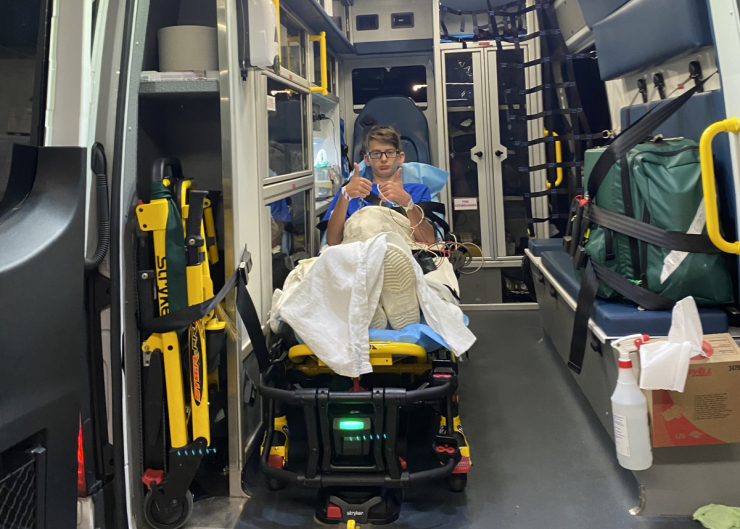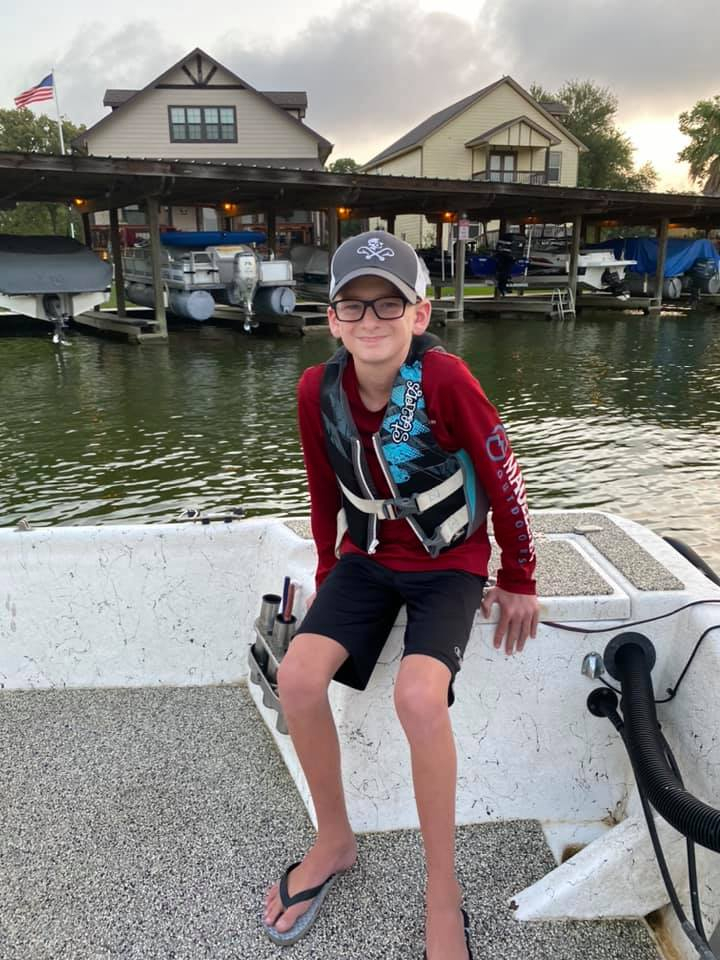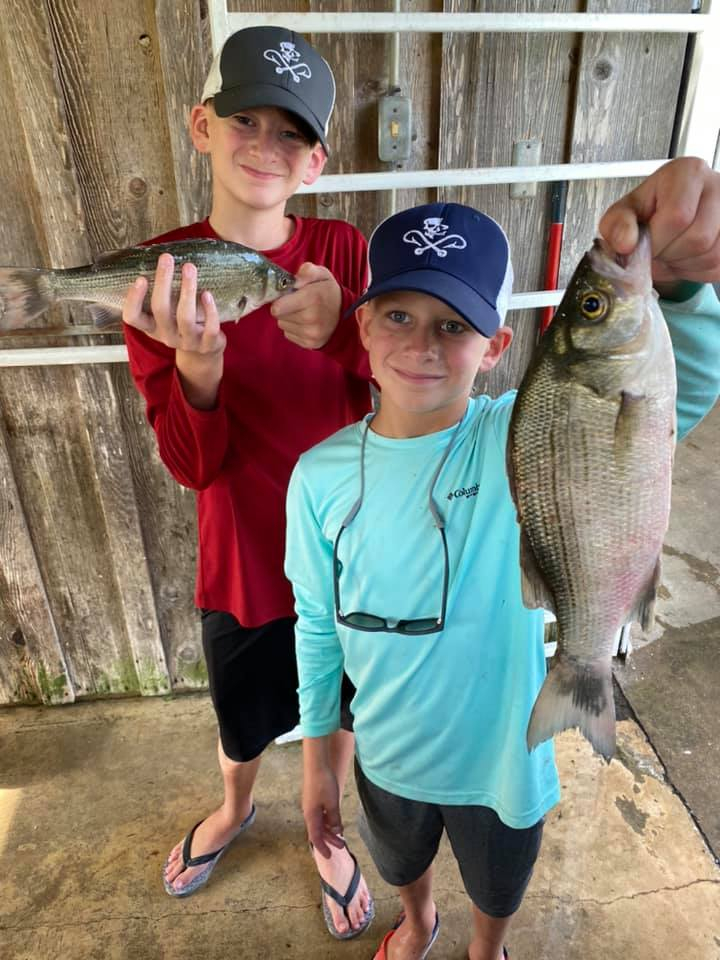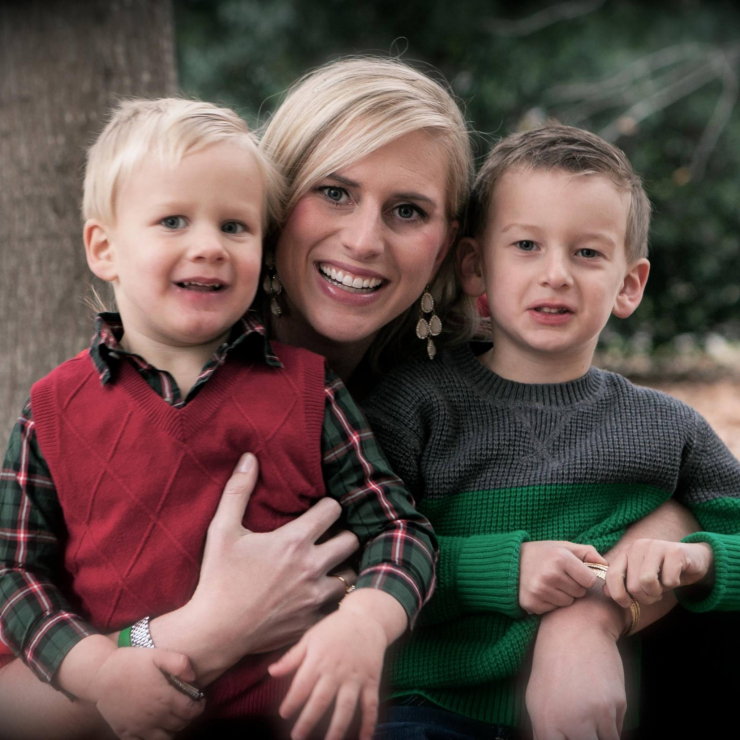
Knowing what came first, what was the catalyst for everything that followed, would define the lives and choices of the Hayes family.
Last March, a then 13-year-old boy named Carson was doing one of the things he loved most in the world: playing baseball. It was practice on a Thursday afternoon the night before spring break was set to begin.

His family had planned a getaway to the Ozarks the next day, anticipating a full week of rest and relaxation, and he was excited to have one last practice before the long road trip.
Minutes later, everything would change.
Carson was hit in the face with a baseball, breaking his nose and sending a stream of blood running down his face. While the initial pain was severe, he later denied any real concerns following the injury.

One evening, a neurologist came into the room to talk to Carson’s dad. He mentioned the phrase “mitochondrial disease” before stepping out into the hallway to talk further in privacy.
But Carson already knew what it meant.
Carson’s stepdad has been a firefighter since graduating high school and is currently the safety and training battalion chief. They were comfortable knowing someone with medical training would be there to keep an eye on him, and he and his family decided to continue with the trip as planned, albeit with one slightly off-center nose.

Over the next several days, Carson began to complain about pain and congestion, telling his parents that it was difficult to breathe. “That wasn’t too alarming, all things considered,” said his mom, Julie, “He had just broken his nose, and we were in a different climate with cold weather and snow, so we figured that was contributing to his discomfort.”

Still, once they returned home, Carson continued to decline. They noticed he was more tired than usual, had started stumbling while he walked, and later had difficulty speaking. That was the final straw, and 10 days after he was first hit with the baseball, Carson was in the ER for brain imaging and evaluation.

“At first, they diagnosed him with cerebellitis,” said Julie. “That’s essentially swelling on the brain, similar to a concussion, but since it’s at the control center for the brain, his major motor skills and function were impacted. At that point, Carson was unable to talk, walk, or recognize what year it was.”

One evening, a neurologist came into the room to talk to Carson’s dad. He mentioned the phrase “mitochondrial disease” before stepping out into the hallway to talk further in privacy.
But Carson already knew what it meant.

In 2011, Carson’s cousin Will was diagnosed with an ultra-rare medical condition called Leigh Syndrome. After his birth, Will had difficulty eating and wasn’t hitting his developmental milestones. Doctors conducted some additional tests and discovered he had Leigh Syndrome, which was genetically inherited from his mom.
Carson’s mom and her three sisters also underwent diagnostics, which revealed each carried the gene.

Leigh Syndrome is a degenerative neuromuscular disease with no cure. Carson’s cousin Will is one of the oldest living patients with Leigh’s at 13 years of age. Carson was diagnosed at 14.

It was baffling because Carson was well past the typical age for symptoms to begin and showed no signs of disease - in fact, he was playing baseball, flag football, attending school and classes with his peers, and hanging out with his friends.

It wasn’t until that night at baseball practice when he broke his nose that any troubling signs appeared.
Doctors guessed that the injury initiated his bad mitochondria, resulting in Leigh Syndrome. But it was a classic chicken-and-egg scenario. Would he have developed Leigh’s anyway? Or did the injury trigger it?
It’s a question with an answer that will continue to elude them.

For Carson, Leigh Syndrome is a finicky beast. When his body is in distress from dehydration or fever, for example, lesions develop on his brain. Those lesions impact the body and limit its ability to function properly until, eventually, the body is unable to recover.
If Carson gets a fever over 101 degrees or contracts a stomach bug (vomiting or dehydration), he will have to go straight to the emergency room for fluids and care – and he’ll have to do that for the rest of his life. It’s truly a life-and-death situation made worse by the fact that it’s unpredictable.
In less than a year, Carson and his family’s lives have completely changed. He now endures seven therapy sessions each week to improve his walking, endurance, fine motor, speech and other life skills.

He has to be careful with the heat and cold to ensure his body is able to function, and hydration is critical. Without enough water, his limited mitochondria are unable to help his body work properly.
If you’re wondering how he’s handled this complete upheaval of all he’s known, you wouldn’t be the only one. Julie told us how he’s continued to bring his quick wit and moody teenager temperament to every situation, joking that he’s the happiest when his younger brother Cameron gets in trouble for breaking the rules. (Carson is a rule follower to the nth degree, and has been from the very start.)

She also told us how he’s no longer able to play baseball at the same level but still wanted to be involved with the sport he loves so much. This year, he’s the team manager instead.
Carson has been dealt a really tough hand, and yet he’s looked for ways to keep moving forward, to keep things as normal as possible. One thing that’s been really difficult, though, is getting in and out of his driveway and house with his walker and wheelchair.

The house just isn’t made to be accessible - and the family hasn’t needed it to be - which has all flipped since that day last March. The driveway has some major cracks and slopes that make navigating it safely nearly impossible.
Then there’s the issue with their current bathroom. Again, they didn’t anticipate needing an extra wide, accessible shower, but that’s the reality of their situation today. Understandably, Carson was less than thrilled with the prospect of his mom continuing to help him get in and out of the shower without falling.
But with mounting medical expenses and new needs, his family wasn’t sure how they were going to swing it all.

Thankfully, Carson’s stepdad had a fellow firefighter at work who had heard of Chive Charities. They knew our donors had supported first responders and their families with medically-related needs and suggested that the family apply.

A few weeks later, we were looking at Carson’s application, jaws dropped and eyes filled with tears.
Through the support of our Green Ribbon Fund and the donors who make it all possible, we approved a major driveway repair for Carson’s home for $9,851. And as we were thinking through the possibility of funding the ADA shower installation, we reached out to our partners at Wonderbelly.

Their mission is to provide clean, sustainable, and effective digestive health medicine, starting with common, everyday heartburn. The co-founder, Noah, just happens to live in Austin, TX, and they were fully on board to support the Hayes family, generously donating $2,000 to fund the cost of materials for the shower.

Once the materials were covered, Julie and her husband, Nathan, thought they might be able to save some money and tackle the demo and renovation themselves. But after the Chive Charities team spoke with them, we wondered if we could do just a little more.
Because of the generous support we receive from donors like you, we took another look at the budget and decided to approve funding for the full cost of the installation, too. When all was said and done, the total impact (including the $2,000 from our friends at Wonderbelly - thanks, guys!) was $17,070.
Julie’s response back when we gave her the good news said it all:

The Hayes family has been through a lot – more than most of us can imagine. And while the road ahead is uncertain, today they have some relief.

It’s hard to find the start of a circle. What comes first: the people who need help or the ones who offer it? At Chive Charities, both are part of who we are and what we do - and we’ve got plenty of room for more. If you or someone you know needs help, find it HERE. And if you or someone you know can offer help, DONATE HERE.
Thank you for being part of it with us!

































-3__small.jpg)












































































































__small.jpg)










__small.jpg)






















































































_with_flag,_jason__emily_rowley-4__small.jpg)

































































































































-2__small.jpg)


























































































































































